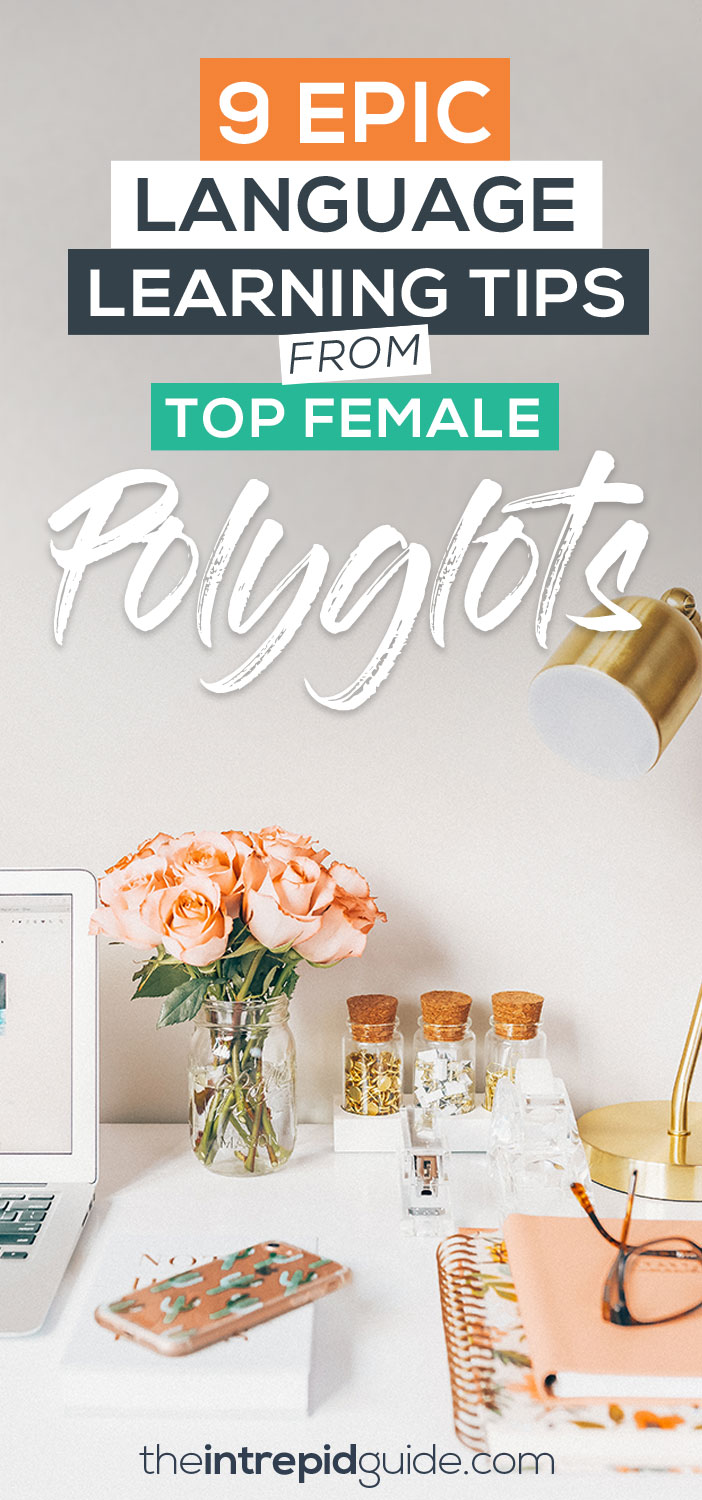Ramp up your language learning game with these 9 powerful language learning tips from 9 top female polyglots.
Back in 2018, I had the pleasure of speaking at the first Women in Language event. This brilliant online conference was the first of its kind to amplify the voice of female polyglots in the language learning space. Each year Women in Language features tonnes of inspiring women who sharing insights, tips, and hacks across various four key topics:
- Starting Languages – Perfect if you’re in the early stages and need a leg up to learn languages better on your own.
- Mastering Languages – Exactly what you need if you’ve already studied a couple of languages or one to a reasonable level and you’re ready to take things further.
- Living with Languages – A great range of presentations about language in your everyday life. From positive language learning for kids to living abroad
- Working with Languages – Curious about the various ways you can bring languages into your working life? There’s plenty here for you too!
As you can see, there’s really something for everyone – no matter what your experience is with languages. Women in Language is back again, 2020 and I’ve asked co-host Lindsay Williams to share some of the best tips speakers have shared from previous years.
Over to you Lindsay!
Hello! Lindsay Williams of Lindsay Does Languages here. Michele has kindly let me hop on her blog to share this guide with you.
I’ve been co-hosting Women In Language now for over 2 years. As we head towards the fourth event 4-7th March 2021, it’s a great chance to look back at some of the epic language learning tips from top female polyglots who’ve spoken at our previous two events.
But first, if you’d like to join us live for this year’s Women In Language event, you can!
The 4 day event happens online, so you can join from anywhere in the world. And, best of all, tickets are just $29. Learn more and get your Women In Language 2021 ticket here.
Tip#1: How to Become Fluent in Social Situations, No Matter Your Level with Géraldine Lepère
In 2019, Géraldine Lepère of Comme Une Française taught us how to become fluent in social situations.
Three key points she shared are to consider not just language rules, but also cultural rules and code words.
By code words, she includes things such as the right greetings for the right situation and those short 1-2 word “scripts” that happen in social situations regularly, such as shops.
Géraldine also shared some French specific tips to help you become fluent in social situations. For example, how conversation is at the heart of the culture, not to smile too much, and how names are quite “personal”, so not to overuse names.
Tip #2: Learning Multiple Languages At Once Isn’t the End of the World (But the Start of It) with Abigail Lang
Personally, I’ve often found myself learning more than one language at once. But there’s a tendency to succumb to the pressure of advice that you can only learn one language “properly” at once.
Thankfully, Abigail Lang at Women In Language 2019 empowered us with the knowledge that we can learn multiple languages at once!
One thing that really struck me that Abigail shared is the nonlinearity of language learning.
When we understand how language learning is never robotic and is always in flux, it enables us to accept that, like Abigail’s talk title suggests, learning multiple languages at once isn’t the end of the world, but the start of it.
But sure, you’ve heard the expression “A jack of all trades is a master of none.”
So that means we’ll never be as good at multiple languages as we would be if we focused on 100% complete and utter fluency with one…or does it?
Abigail ended her session by sharing the lesser heard ending to that quote:
“A Jack of all trades is a master of none, but oftentimes better than a master of one.”
Tip #3: How to Create an Authentic Language Immersion Travel Experience with Tamara Marie
Drawing from her experiences travelling in Latin America and making the most of those trips to improve her Spanish, Tamara Marie of Learn Spanish Con Salsa taught us how to do just that for any language.
Tamara split her talk into two: what to do before you arrive and what to do when you’re there.
Before you arrive?
Tamara suggests…
- Keeping up with local current events and using that for practice
- Finding activities you love and want to do there so you can learn the most relevant vocab for you
- Learning some regional vocabulary, such as slang or features of the accent you can expect to hear
- Finding a good language school where you can register to attend
And when you’re there?
- Ditch the resort to give yourself access to much more authentic experiences
- Talk to people! Get some conversation starters at the ready!
- Get out of your comfort zone and embrace activities you wouldn’t normally do.
Recommended: 7 reasons why you should go on a language holiday
Tip #4: La Dolce Vita: How This Australian Moved to Italy with Michele Frolla
While we’re on the subject of travel, this is a great chance to mention The Intrepid Guide’s very own Michele who spoke at the first Women In Language in 2018 about her move to Italy.
Michele shared 6 great reasons why living abroad and learning a foreign language will change your life, so if you’re dreaming of some long-term immersion, here’s some inspiration:
- Learn ‘survival skills’ and patience.
- Deeper understanding of the world (including appreciating your home country more!)
- Meeting new people gives you a new way of thinking.
- Making lifelong friends.
- Learn about yourself (some deep soul searching!)
- Developing more confidence and independence.
Not to mention all the health benefits that come with learning a second language.
Tip #5: The 2 Keys to Making Language Learning Into a Tool Against Anxiety with Elena Gabrielli
Language learning isn’t just for the über-extroverted, as Elena Gabrielli of Hitoritabi proved with her session at Women In Language 2019.
Elena shared how to make language learning a tool against anxiety.
The first key here is reflection, so you can look at what works for you and language learning, what doesn’t work and adjust accordingly.
And the second key? Creativity!
When learning a language solo, you become your own teacher. And that in turn allows for you to get creative with how you want to learn.
The advantages to this that Elena shares are that you get out of “textbook mode”, learn what’s relevant and enjoyable for you, and become excited about studying.
Tip #6: Fast Track Language Learning with Judith Meyer
Back at our first event in 2018, Judith Meyer broke down the myths of speedy language learning with read numbers and figures to make it possible and achievable for everyone.
As well as explaining how to pick the right tasks for optimum learning (not too easy, not too difficult), Judith highlighted how long it takes to learn a language, and how this breaks down over time.
To reach a comfortable conversational level, Judith recommends 40-60 hours of study.
She shows how this works across a 6 week plan, equating to 7-10 hours per week, and a 3 month plan.
If you’re aiming for conversation in 3 months, you’ll want at least 3.5 to 5 hours a week, which is a minimum of 30 minutes per day.
But remember, if you’re aiming to go beyond conversation, it’ll take many more months and hours of study to get there!
Recommended: How long does it REALLY take to learn a language? [A Practical Guide]
Tip #7: Rising Above and Beyond: Overcoming the Language Learning Plateau with Maureen Millward
Experienced language learner Maureen Millward from Language Learning Journey shared so much in her session at Women In Language back in 2018 that it’s impossible to mention everything here!
As well as the ultimate goal of travelling to a place that speaks the language to really get to use it, Maureen helpfully broke things down to different skills.
For example, when it comes to speaking, she suggests online lessons, language exchange, meetup groups, and other local community events.
Another thing that really stood out to me, and something that’s especially helpful at the intermediate stage is the idea of having an intensive day with the language you’re learning.
For example, plan some study time but mix it up with other things too.
Perhaps live lessons online, some time to watch your favourite show in the language. Maybe even exercise videos in the language or using a traditional recipe in the language to cook from.
This also leads nicely to our next piece of expert advice…
Tip #8: Why Immersion is Key and How To “Immerse” Yourself with Shahidah Foster
Shahidah Foster runs Black Girls Learn Languages and is the co-host of a fellow online event for language learners, the Sisters Only Language Summit, to showcase and unite black women who share a passion for language learning.
Shahidah also spoke at Women In Language in both 2018 and 2019!
In 2018, she drew from her experience living and working in Germany to share some helpful advice on immersion.
I appreciated how as well as sharing the benefits of in-country immersion, Shahidah also highlighted how it’s possible anywhere through creating an immersion environment.
She suggests changing what you listen to, watch, read, and write to help to create a more immersive environment wherever you are in the world.
Recommended: 13 ways to seamlessly integrate language learning into your daily life
Tip #9: Are You Making The Most Of Your Language Lessons? with Cher Hale
But if you’re creating an immersive environment from home and looking to book some online language lessons as part of that, it can be too easy to assume that the language will just…”happen”, effortlessly.
As much as online lessons will help, it isn’t quite true.
Cher Hale of The Iceberg Project taught us how to make the most of language lessons though, so we’re set!
She recommends booking structured lessons based on conversational topics. This may mean trying a couple of different tutors until you find one that works for you. That’s ok.
You also might find that you want shorter lessons as they can be quite intense.
Another thing she recommends is asking better questions. This includes giving your own question and answer examples to confirm your understanding.
It’s also helpful here if you can ask for full sentence responses rather than single words. This will help you to begin to hear and understand words in context instead of just in isolation.
And finally, Cher recommends recording your lessons.
There are a few benefits here, but two key ones are the chance to review what you’ve learned and the opportunity to create flashcards based on new vocabulary and structures from each lesson.
Join Women In Language 2021!
If you want to learn more from expert female and non-binary voices in language, join us for this year’s Women In Language.
We’ll be live for 4 days, 4th to 7th March 2021, and you’ll get lifetime access to all recordings for catch up too.
Learn more and get your ticket here!
See you there!
Want to know more about learning languages? Start here!
- 22 Top Language Learning Resources You Should Use
- 10 Proven Memory Hacks: How to Remember New Vocabulary Faster
- How long does it REALLY take to learn a language? [A Practical Guide]
- 10 Proven Memory Hacks: How to Remember New Vocabulary Faster
- 18 Unexpected Advantages & Health Benefits of Learning A Foreign Language
- 23 Cool Gift for Language Learners They Will Actually Use and Love
- Memrise vs Duolingo: Which Language App is Best For You?
- Mondly Review: 10 Ways Mondly Drastically Improved My Language Learning
- 203 Most Beautiful Untranslatable Words [The Ultimate List: A-Z]
- 6 Language Learning Tips: How to Learn a Language from Home
- What Type of Language Learner Are You? Your 4-Step Personalised Learning Plan
- 44 Best Movies on Disney Plus for Learning Languages
- 13 Ways to Seamlessly Integrate Language Learning into Your Daily Life
- 10 Pro Tips: How to Learn a Language with a Full-Time Job
- 7 Reasons Why You Should Go on a Language Holiday
- Essential Travel Phrases: How to be Travel Fluent in 10 Simple Steps
- How to Learn Your First Foreign Language in 8 Simple Steps: A Beginner’s Guide
- 11 Life-Changing Reasons Why You Should Learn a Language
- 42 beautiful Inspirational Quotes for Language Learners
- Language learning tips: 11 Polyglots Reveal The Secrets of Their Success
- Top 10 Best Ways to Learn a Language Better and Faster
- How Many Languages are there in the World?
- 78 FREE Dictionaries to Learn a Language Fast [Free eBook Download]
- 22 KEY Travel Phrases That Will Transform Your Travels [Free Guide]
Like it? Pin it for later!

Over to you!
Which of these tips resonates with you the most? What else would you add to this list?
Let me know using the comments section below or join me on social media to start a conversation.
Thanks for reading and I hope you enjoyed this post.
Like what you see? Subscribe using the form below to have all of my posts delivered directly to your email.

